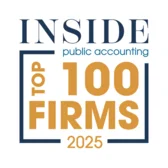On December 27, 2020, President Trump signed the fourth phase of COVID-19 stimulus, the 2021 Consolidated Appropriations Act ("Act"), a nearly $1 trillion piece of legislation. The Act includes tax extenders, credits and incentives, direct relief for individuals, additional lending relief for businesses impacted by COVID-19, and funding for the Federal government. Inclusive in the broader budget bill is the Economic Aid to Hard-Hit Small Businesses, Nonprofits, and Venues Act, allocating $325 billion in relief to small businesses, including $284 billion for a second round of Paycheck Protection Program (PPP) loans.
Updates to the Paycheck Protection Program (PPP)
Clarification of Tax Treatment of Forgiveness of PPP Loans. The new legislation has clarified that debt forgiven under the PPP is not includible in gross income because of forgiveness. The Act further states that these expenses will also be deductible for income tax purposes and that loan forgiveness is tax-exempt income resulting in an increase to outside basis under Section 705 and 1366 of the Code for partnerships and S Corporations, respectively.
PPP Loan Eligibility. The second round of PPP loans will be made available for certain eligible borrowers, including:
- Borrowers that experienced a decline in gross receipts of more than 25% during the first, second, or third quarter of 2020 compared to the same quarter in 2019. For applications submitted after January 1, 2021, the fourth quarter will be included.
- Borrowers with fewer than 300 employees, on an affiliated basis. For companies with multiple locations, the eligibility limit on employees would increase to 500 employees.
The bill identifies the following as ineligible to participate in the PPP program: publicly-traded companies, entities with China-based ownership or China-resident board representation, lobbying groups, and shuttered venue operators participating in the $15 billion set-aside grant program (described later).
Maximum Loan Amount. The maximum loan amount will be $2 million for all borrowers and is calculated as the lesser of $2 million or the following:
- 2.5 times monthly payroll costs incurred in either of the following periods: (1) one year period ending with the date of a loan, or (2) calendar year 2019.
- For borrowers with NAICS codes beginning with 72, primarily accommodation and food services, the multiplication factor will be 3.5 times payroll.
Eligible Expenses. The legislation maintains the same qualified expenses for both payroll (gross compensation, retirement benefits, state and local taxes, and health insurance) and non-payroll (mortgages, rent or lease payments, and utilities) costs. The list of eligible expenses has been expanded to include the following:
- Covered Operations Expenditures. Payment for any business software or cloud computing service that facilitates business operations, product or service delivery, the processing, payment or tracking of payroll expenses, human resources, sales and billing functions, or accounting or monitoring of supplies, inventory, records, and costs.
- Covered Property Damage. A cost related to property damage and vandalism or looting due to public disturbances during 2020 was not covered by insurance or other compensation.
- Covered Supplier Costs. An expenditure made by an entity for the supply of goods that are essential to the operations of the entity at the time at which the expenditure is made and is made under a contract, order, or purchase order.
- Covered Worker Protection Equipment. An operating or capital expenditure to facilitate the adaptation of the business activities of an entity to comply with requirements established or guidance issued by the HHS, CDC, OSHA, or any equivalent State or local government related to the maintenance of standards for sanitation, social distancing, or any other worker or customer safety requirement related to COVID–19. The expenses must have been incurred between March 1, 2020, and the national emergency declaration’s end to be eligible.
The legislation maintains the 60/40 split between payroll and non-payroll expenses.
Covered Period. Borrowers can now choose any period between 8- and 24-weeks as their loan forgiveness covered period.
Simplified Process for Loans Less Than $150,000. The forgiveness application for loans less than $150,000 will now be limited to a single page and only require borrower certifications.
Economic Injury Disaster Loans (EIDL)
Clarification of Tax Treatment. The legislation has deemed that any advance under Sec. 1110(e) of the CARES Act, also known as EIDL “advances” or “grants,” shall not be included in the gross income of the person that receives such advance or funding. Further, no deduction shall be denied or attribute reduced for tax purposes, and these advances may also increase the distributive basis of a partner in a partnership or S Corporation.
Repeal of Forgiveness Reduction. The Act repeals Sec. 1110(e)(6) of the CARES Act, which retroactively eliminates the need to reduce loan forgiveness amounts by the amount of the EIDL “advance”.
SBA Debt Relief
Extension of Debt Relief. The Act extends the current debt relief program as prescribed in Sec. 1112 of the CARES Act. Under this provision, the SBA shall pay the principal, interest, and any associated fees owed on a covered loan in a regular servicing status. While limitations may apply, the SBA shall begin making payments on loans whether or not currently on deferment. The payments will start with the next payment due on the covered loan and continue for six months. For specific NAICS codes, loans will be made for three months beginning February 1, 2021, plus the additional 5-month period immediately following the initial three-month period.
Clarification of Tax Treatment of SBA Debt Relief. The legislation states that any payments under Sec. 1112(c) of the CARES Act shall not be included in the person’s gross income that receives such advance or funding. These debt relief payments include those made directly to the lender on behalf of the borrower for participants in the SBA’s 7(a) loan program. Further, no deduction shall be denied or attribute reduced for tax purposes, and these advances may also increase the distributive basis of a partner in a partnership or S Corporation.
Venue Operators Grant Program
The bill has a set-aside provision of $15 billion for shuttered venue operators. These businesses include live event venues, independent theaters, museums, and zoos that have experienced pandemic-related revenue losses. The grant amounts are based on a tiered system of revenue losses ranging from April 1, 2020, to December 31, 2020, compared with 2019.
Miscellaneous Other Provisions in the Act
In addition to these changes, the Act includes several tax extenders, individual relief provisions, and credits and incentives.
- The Employee Retention Tax Credit will be extended through June 30, 2021. The new legislation (1) increases the credit from 50% to 70% on qualifying wages, (2) expands eligibility by reducing the necessary decline from 50% to 20%, (3) increases the limit per worker from $10,000 annually to $10,000 quarterly, and (4) increases the definition of “large employer” from 100 to 500 employees. The credit is now available to government employers and companies who were not in existence during 2019 and PPP participants.
- Sick and Family Leave Credits enacted in the Families First Coronavirus Response Act will be extended through March 31, 2021. Those eligible for these credits will be expanded to include self-employed individuals as well.
- Business meals will be fully deductible for food and beverage expenses provided by restaurants and paid or incurred before January 1, 2023. However, “entertainment” is excluded from this change.
- Direct payments will be made to individuals of $600 for a single taxpayer and $1,200 for joint filers, plus $600 per dependent child. The credit will phase out for single taxpayers with modified adjusted gross income over $75,000, head-of-household filers with AGI over $112,500, and $150,000 for joint filers.
- The repayment period on any deferral of an employee’s withholding on social security taxes has been extended until January 1, 2022. The deferral opportunity was granted via Presidential Memorandum on August 8, 2020.
- Unemployment insurance assistance of $300 in weekly federal unemployment payments will continue through March 14, 2021.
The full text of the 2021 Consolidated Appropriations Act can be found here. We expect additional guidance from the Small Business Administration and the U.S. Department of Treasury over the course of the next several weeks. Please contact your HCVT professional for questions about the Act.

